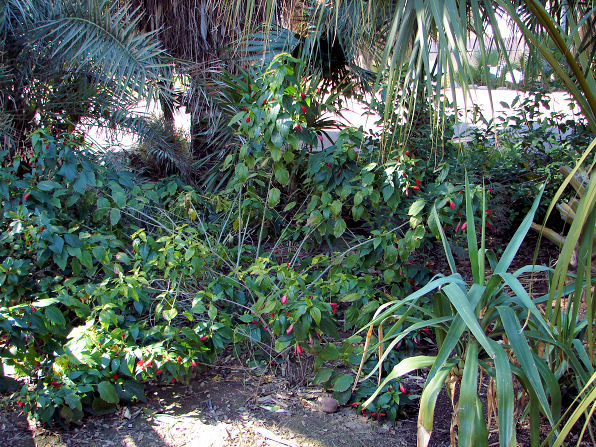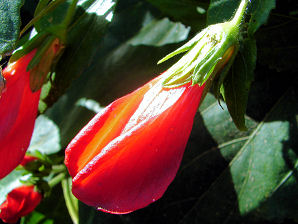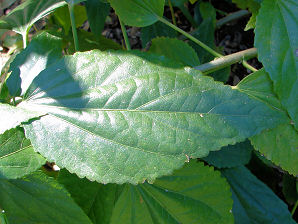Xeriscape Landscaping Plants For The Arizona Desert Environment.
Pictures, Photos, Information
Descriptions, Images, & Reviews.
Shrubs.
Mexican Turk's Cap, Malvaviscus arboreus var. mexicanus.
We Are Proud Of Our SafeSurf Rating!
Click On Any Of The Following Links By Amazon.Com
For Books, & Videos About Wildflowers Of Arizona & The Southwest USA. No Obligation!
 |
| Mexican Turk's Cap, Malvaviscus arboreus var. mexicanus. February 8, 2008. Phoenix, Arizona Zoo. |
|---|
 |  |
| Flower. Mexican Turk's Cap. Malvaviscus arboreus var. mexicanus. | Leaf. Mexican Turk's Cap. Malvaviscus arboreus var. mexicanus. |
|---|
Mexican Turk's Cap.
We wish to thank Wikipedia, the free encyclopedia for some of the information on this page. We share images and information with Wikipedia. Malvaviscus arboreus is a species of flowering plant in the hibiscus family, Malvaceae, that is native to the tropical regions of the Southeastern Gulf United States, Mexico, Central America, and South America. The specific name, arboreus, refers to the tree-like appearance of a mature plant. It is now popular in cultivation and goes by many English names including Turkcap, Turk's Turban, Wax Mallow, Ladies Teardrop and Scotchman's Purse. Its flowers do not open fully and help attract butterflies and hummingbirds. Its flowers that are similar to those of Hibiscus however the petals only partially unfurl, producing a narrow funnel shaped flower, giving it the common name of Turk's Cap. Mexican Turk's Cap reaches about 3 - 4 feet with an equal spread in Phoenix. It has bright red flowers that are about 2 to 3 inches long. Turk's Cap requires full sun or partial shade. It does best in partial shade in Phoenix. The flowers attract bees and humingbirds into the garden.
This plant's main blooming time is fall, winter, and early spring. It will, however, occasionally bloom at any time of the year.
Quick Notes:
Height: Up To 3 to 4 feet tall and 3 to 4 feet wide.
Flowers: Bright red flowers that are about 2 to 3 inches long.
Flowering Time: Mid February - November.
Leaves: Simple softly pubescent acuminate leaves, approximately 5 - 6 inches in length, with rounded, cordate bases. Leaf margins are serrated, and venation is palmate with the leaf having three distinct tips.
Found: Native of Mexico and Cuba and also to the Gulf States in the U.S. The USDA claims it is native to the USA (FL, HI, NC), USA+ (PR, VI).
Hardiness: Reported to be root hardy in Zone 8b.
Soil pH requirements:
Sun Exposure:
Elevation: Naturally found between 0 to 1,800 feet.
Habitat: Well-drained soils. Needs some water but could be considered a Xeriscape Landscape Plant in Arizona.
Miscellaneous: Flowering Photos Taken February 8, 2008. Phoenix, Arizona Zoo.
|
We Are Proud Of Our SafeSurf Rating!
Click On Any Of The Following Links By Amazon.Com
For Books, & Videos About Wildflowers Of Arizona & The Southwest USA. No Obligation!
| © 1966 - Present, Audrey, Eve, & George DeLange |
